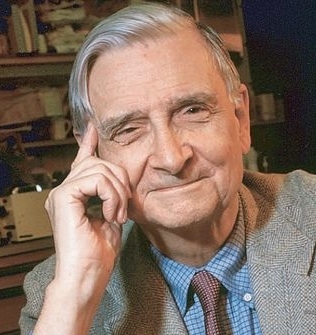On this date in 1929, biologist and author Edward Osborne Wilson was born in Birmingham, Ala. His father, Edward Osborne Wilson Sr., worked as an accountant. His mother, Inez Linnette Freeman, was a secretary. They divorced when he was 8. He had a nomadic childhood, mostly with his father, an alcoholic who would kill himself.
Wilson earned his B.S. and M.S. in biology from the University of Alabama and a Ph.D. in 1955 from Harvard, the same year he married Irene Kelley. They had a daughter, Catherine. He joined the Harvard faculty in 1956, where he retired in 2002 at age 73, although he published more than a dozen books after that.
Blinded in one eye by a fishing accident as a child, his research focus was in the field of myrmecology, the study of ants. He discovered the chemical means by which ants communicate. His books include The Insect Societies (1971) and The Ants (1990), co-written with Bert Holldobler, which won the 1991 Pulitzer Prize for nonfiction. Wilson’s On Human Nature won a Pulitzer in 1979.
Wilson is perhaps best known for his intellectual syntheses, often connecting evolution and biology to other disciplines. His 1967 book, The Theory of Island Biogeography, which develops the mathematics of how species evolve in geographically small habitats, is influential in the fields of ecology and practical conservation. He worked out the importance of habitat size and position within the landscape in sustaining animal populations.
In 1975 he published Sociobiology: A New Synthesis, which connected the evolution of social insects with other animals, including humans. At the time, the idea that human behavior is genetically influenced was very controversial and Wilson was criticized as racist and sympathetic to eugenics. During a 1978 lecture he had a pitcher of water poured on his head while the attacker exclaimed, “Wilson, you’re all wet.”
More recently, Wilson was criticized by Monica McLemore, an associate professor at UC-San Francisco, for espousing “theories fraught with racist ideas about distributions of health and illness in populations without any attention to the context in which these distributions occur.” She added that “what works for ants and other nonhuman species is not always relevant for health and/or human outcomes. For example, the associations of Black people with poor health outcomes, economic disadvantage and reduced life expectancy can be explained by structural racism, yet Blackness or Black culture is frequently cited as the driver of those health disparities. Ant culture is hierarchal and matriarchal, based on human understandings of gender. And the descriptions and importance of ant societies existing as colonies is a component of Wilson’s work that should have been critiqued. Context matters.” (Scienfic American, Dec. 29, 2021)
Wilson expanded on the ideas propounded in Sociobiology in On Human Nature (1978), which spawned the discipline of evolutionary psychology. While initially widely accepted with some enthusiasm, some aspects of evolutionary psychology research became even more controversial than Sociobiology, with the line between the two fields becoming more blurred.
Wilson’s parents were Southern Baptists though he was also raised by conservative Methodists. He abandoned Christianity before college, later describing himself as a “provisional deist” and agnostic. In On Human Nature, he argued that belief in God and rituals of religion are products of evolution. He disdained the tribalism of religion: “And every tribe, no matter how generous, benign, loving, and charitable, nonetheless looks down on all other tribes. What’s dragging us down is religious faith.”
In Esquire magazine (Jan. 5, 2009), Wilson said: “If someone could actually prove scientifically that there is such a thing as a supernatural force, it would be one of the greatest discoveries in the history of science. So the notion that somehow scientists are resisting it is ludicrous.”
He has been honored by the American Humanist Association twice, in 1982 with the Distinguished Humanist prize and again in 1999 as the Humanist of the Year. In 1990, he was awarded the Royal Swedish Academy of Science’s Crafoord Prize in ecology, considered the field’s highest honor. He died in Massachusetts at age 92. (D. 2021)
PHOTO by Jim Harrison under CC 2.5.


